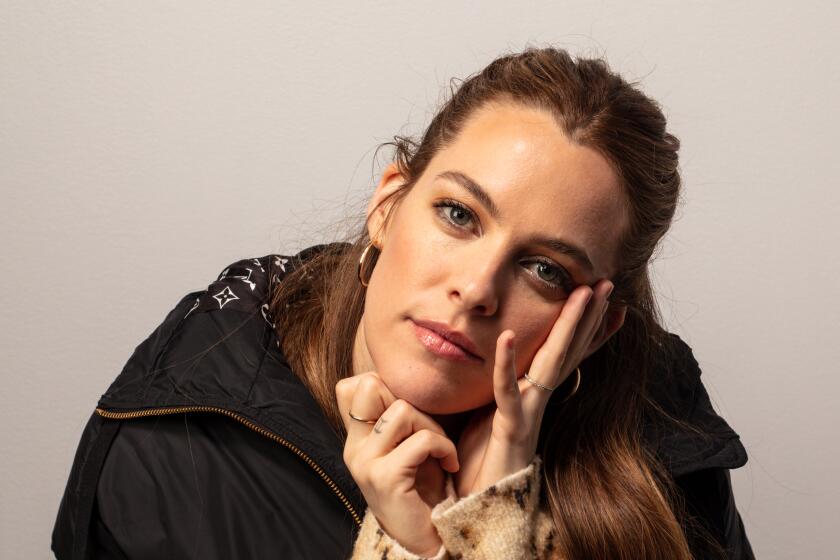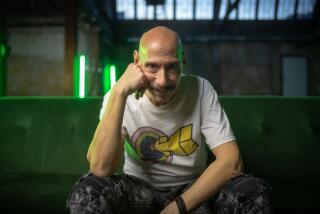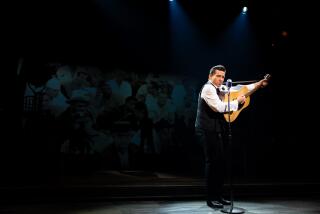‘Daisy Jones & the Six’ review: Riley Keough fronts a rock soap opera
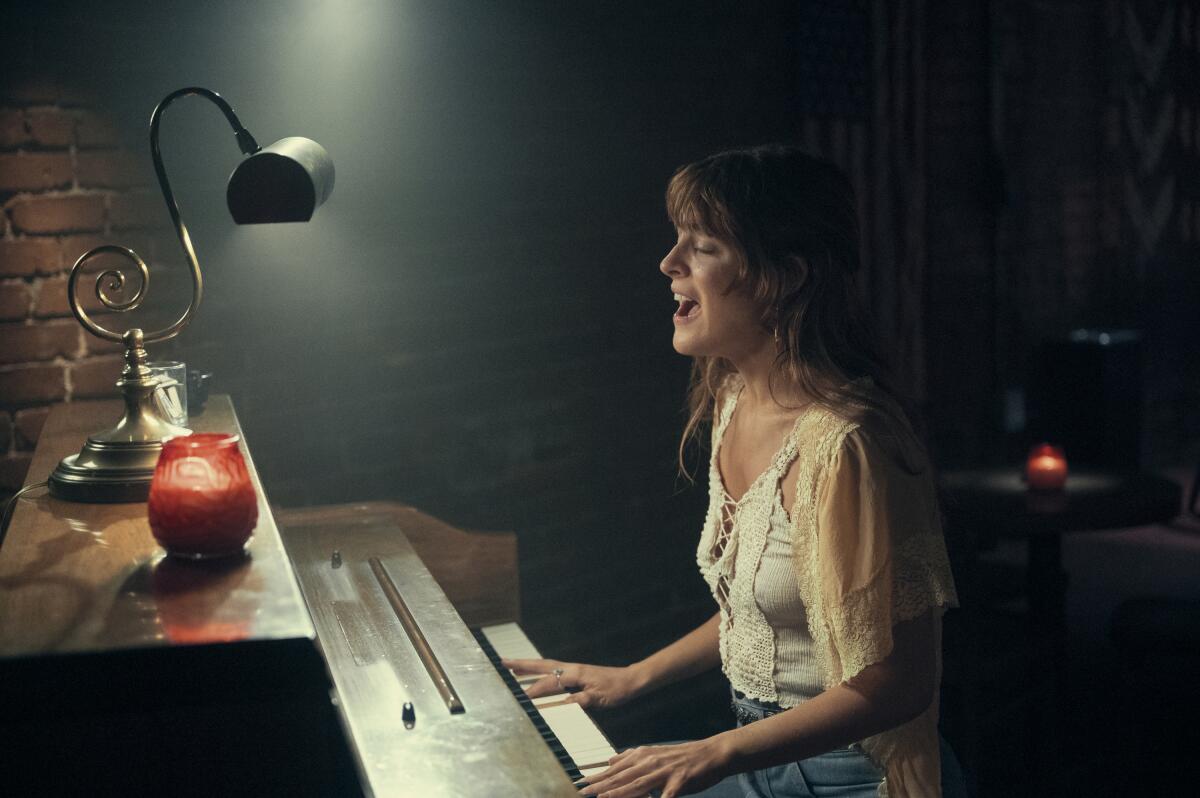
- Share via
Adapted by Scott Neustadter and Michael H. Weber (“The Disaster Artist”) from the novel by Taylor Jenkins Reid, “Daisy Jones & the Six” is a soap opera wrapped inside a period backstage musical. Set largely in the 1970s, the novel is rendered as an oral history, the story of the slow-then-fast rise and sudden fall of a rock band. The 10-episode series, premiering Friday on Amazon Prime Video, echoes it with a documentary framing — that is, the action is interspersed with scenes in which characters respond to an interviewer 20 years in the future (the late ’90s, saving the production team the trouble of aging the characters half a century).
If it gains an actual soundtrack, the book does lose something in translation, as multiple narrators’ viewpoints are largely merged into a straightforward telling. Reid’s approach also means there’s not a lot of dialogue on the page, and so the adaptation is very much a thing of extrapolation and elaboration, with changes and additions to make it more conventionally dramatic — more like a TV series. And as a TV series, it’s perfectly fine, in a paradoxically low-wattage, high-intensity way, though it does go on a little long and requires some willful suspension of disbelief.
Riley Keough plays Daisy, a poor little rich girl from the Hollywood Hills, whom we first meet knocking around the Sunset Strip as a teenager in the late 1960s, getting into trouble more implied than shown. Later, she starts to scribble her deepest thoughts into lyrics, and she works her lyrics into songs. (It felt “even better than drugs,” future Daisy remembers.)
Meanwhile in a Pittsburgh suburb, working-class Billy Dunne (Sam Claflin) is coaxed into joining the garage band of his kid brother Graham (Will Harrison); they play proms and parties and local bars until a chance meeting with an L.A.-based tour manager (an amusing and amusingly bewigged Timothy Olyphant as Rod) gives them the idea to move to California, along with Billy’s girlfriend Camila (Camila Morrone).
Though mum on the legal drama catalyzed by mom Lisa Marie Presley’s death, Riley Keough is forging ahead to promote TV’s ‘Daisy Jones & the Six.’
A famous record producer, Teddy Price (Tom Wright), independently impressed by Daisy and by Billy’s band, puts them together, much against Billy’s will. But a hit single makes her joining the Six inevitable, and things progress, and regress, and digress and become a mess from there.
The group that seems to have inspired Reid is Fleetwood Mac, which, with its shifting intramural love relationships, sundry drug problems and issues of control — the soapiest of rock’s many operas — was a romance novel/miniseries waiting to happen. There’s no attempt here to replicate that band’s subtler, softer sound — the Six’s music tends toward bombast — or its long and complicated history, apart perhaps from being the story of a blues-based band that becomes famous after adding a California folkie to the mix.
There isn’t any one-to-one correspondence between the members either, even if Keough, twirling in her diaphanous stage gear does channel Stevie Nicks a bit, and Claflin is more or less the controlling Lindsey Buckingham of the group, and Suki Waterhouse’s Karen, like Christine McVie, is an English keyboard player. Still, I would be very surprised if Keough and Claflin had not studied live video of Stevie and Lindsey locking eyes on “Silver Springs.”
The series expands the role of Daisy’s friend Simone (Nabiyah Be), described as a “disco pioneer,” who in the book serves mostly as a witness to Daisy’s misadventures. Here she gets her own thread, including a romance, while producer Teddy is given some extra motivation — he’s in need of a hit after several misses. (Their characters also give the series some ethnic diversity.) Camila, who is an important voice in the book but has little to do besides keeping her marriage and family together, becomes a photographer here. And a short passage in the novel set in Thailand becomes a long one set in Greece.
That Patti Smith’s “Dancing Barefoot” serves as the theme song for the series underscores the fact that this is primarily Daisy and Camila’s story, focused on women in music and the world, and what was expected of them and from them. (“I’m not the muse,” insists Daisy, whose beauty makes men want to own her. “I’m the somebody.”) As underdog heroines, harassed and exploited even as they’re worshiped, the female characters, and actors, make stronger impressions than the male — Keough and Monroe, especially, but Waterhouse and Be in their smaller parts as well.
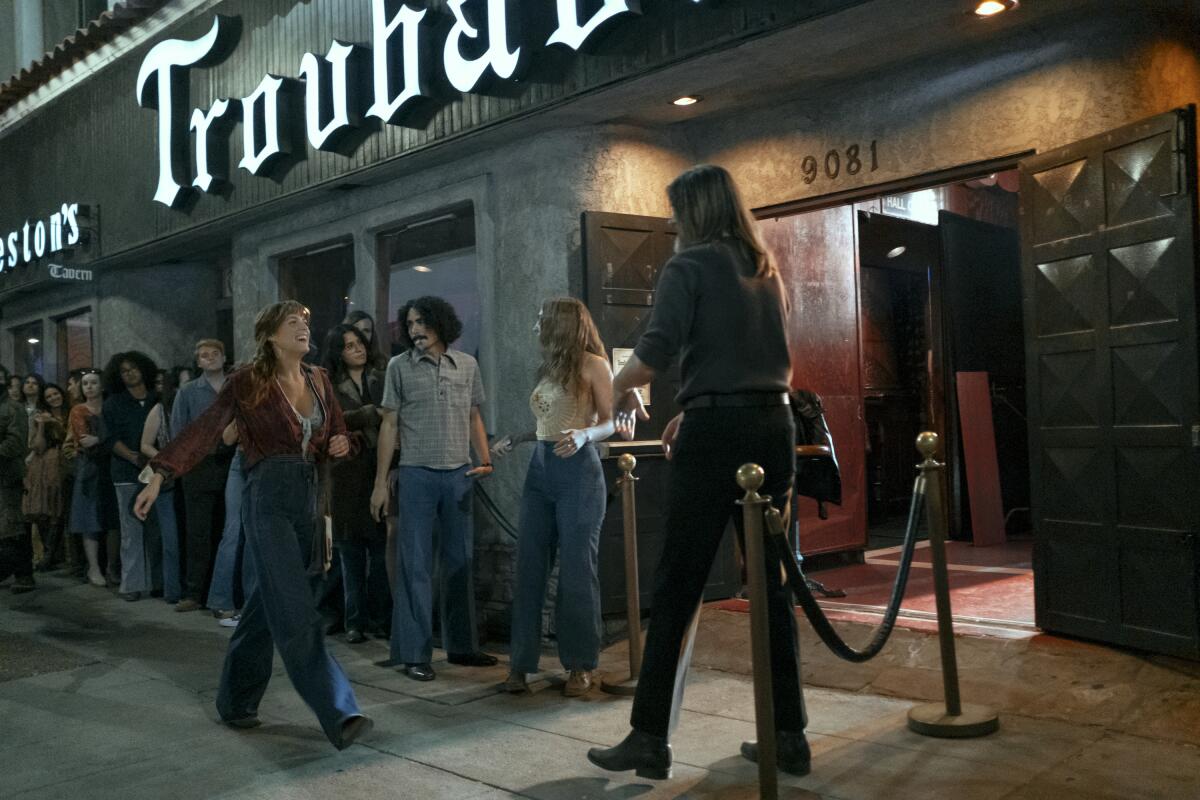
Though the music is obviously a hook and provides a setting in which sex, drugs and rock ’n’ roll may roam free, the series is nevertheless rife with tropes well worked over a century of show biz dramas — the tortured creator, the uncompromising vision, the career cursed by addiction, sexual attraction between creative partners, art versus commerce, art versus life. One reason these tropes exist, of course, is that there’s truth in them: Numerous episodes of “Behind the Music” have taught us that pop bands experience moments of dysfunction, to put it mildly. And as someone who has had the occasion to travel in a band, in vans and buses, I can tell you that even the best of friends can get on one another’s nerves when locked into close quarters for weeks on end and the lead guitar player refuses to turn down or move his amp even a foot out of your way. Most of the character types and incidents in “Daisy Jones,” outrageous or banal, have had their equivalents (and worse) in the real rock world, which does not make the series itself feel especially real.
Still, in a bid to smudge the line between the fictional and the actual, two songs from the band’s album, “Aurora,” were pre-released on music streaming platforms. This isn’t a new gambit — “The Monkees” was created in part as a machine to sell records that would in turn promote the television show. But the Monkees also became a real band with contemporary hits, and one that continued to record new music as recently as 2018, whereas Daisy Jones & the Six is a generic retro pastiche, its music cobbled together from strains of ’70s folk rock, with the help of Phoebe Bridgers, Marcus Mumford and Jackson Browne.
The songs are catchy, if you listen enough times, but it takes some imagination to accept the Six as “one of the biggest bands in the world,” or to invest in what we’re meant to take as the powerful chemistry between Billy, who is a bit of a pill, and Daisy, who is generally sunny, despite her lack of impulse control and the occasional drug montage.
Whether or not you buy her as a rock goddess, Keough makes a potent impression as a wayward free spirit. (Claflin, if only because his character spends so much of the series angry or miserable, is less good company.) There’s a tendency to make the music seem more crucial than fun — it’s a drama, so I suppose dramatic things take precedence — but there are moments of genuine spirit, perhaps most notably a group sing of Ronnie Lane’s “Ooh La La” that gives Waterhouse’s Karen more of a spotlight than her bandmates ever do.
Oddly, when it comes to pop music, comedy tends to tell the story better than drama; what play as cliches when taken straight work as the satire the milieu so readily invites. One episode of “Girls5eva” will tell you more about the music business than do 10 of “Daisy Jones,” and “We Are Lady Parts” present a better argument about why one might want to be in a band. “That Thing You Do” shares more than a few plot points with “Daisy Jones,” with the advantage of not having to oversell the importance of the Wonders. And “Spinal Tap” remains gospel among musicians — “puppet show” is shorthand every gigging player understands.
“Daisy Jones & the Six” is really best seen as a somewhat sensational romance only incidentally about music, an enacted beach read about big egos in hate and love and, ultimately, of sobriety, family and, of all things, fidelity.
‘Daisy Jones & the Six’
Where: Prime Video
When: Any time
Rating: 16+ (may be unsuitable for children under age 16 with advisories for substance abuse, alcohol use, smoking, violence, sex and coarse language)
More to Read
The complete guide to home viewing
Get Screen Gab for everything about the TV shows and streaming movies everyone’s talking about.
You may occasionally receive promotional content from the Los Angeles Times.
